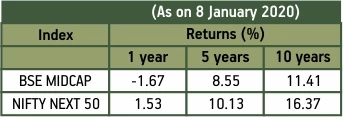-
Our Products
Our FundsFocus Funds
-
Self Care
Self-ServiceFind InformationWays To TransactPartner Solutions
-
Downloads
- Learnings
- About Us
-
More
-
Shareholders
-
Shareholders
-
Updates
-
-
SIP Calculators
- Back
-
Shareholders
The 'V' Factor in market related investing
Jan 20, 2020
5 mins
5 Rating

Every leading newspaper and expert stock advisor can be seen quoting and commenting on the high ‘volatility’ of the stock market. Investors seem to be in a tizzy on how to deal with this volatility in their investment planning. But, what is market volatility?
Volatility in the context of the stock market represents the extent of price fluctuations or variances of stocks and indices that are primarily driven by underlying market factors. NSE in India in fact has an index - India Volatility Index (India VIX) to measure and track investors’ perception of the market volatility.
Why are stock markets volatile?
Volatility can increase due to various factors ranging from impact of global market price movements to political and policy changes to investor sentiments to n number of micro and macro economic factors. Volatility is the risk that impacts even the most established and stable stocks. When volatility is low, stocks can rise on the back of the growth potential of the underlying companies and sectors.
Volatility is thus the investment/market risk associated with stock market investments. More often than not volatility is difficult to predict and even tougher to factor in.
Can we dodge volatility in our investments?
Different investors develop different strategies to deal with market volatility. Novice investors may opt for simple options such as SIP investing, hybrid asset allocation and further diversification amongst stocks and funds to balance out risks. While these strategies may be good to cover company based and sector based risk, they may fall short in covering the inherent market volatility that are driven by a wide variety of less predictable factors.
Seasoned investors may opt for complex strategies such as derivative trading to reduce exposure to market volatility. This requires continuous monitoring of the market and timing of investments. While these strategies when applied correctly can help reduce volatility to some extent they cannot eliminate volatility entirely.
Is there a better way?
The one true way and probably the best way to shield your investments from market volatility is to be invested over a long term. Let’s look at a practical demonstration of this through the returns of a few historically volatile indices on the stock market – BSE MIDCAP and the NIFTY NEXT 50 over the years:

Source: https://www.bloombergquint.com/markets/equities/historical-returns
As can be seen, in the short run of 1 year the extreme volatility faced by the market has resulted in negative or minimal returns for both the BSE MIDCAP and the NIFTY NEXT 50 index. In relatively longer periods however, the returns have stabilised to give positive returns. This indicates that in the long run the impact of the market volatility is limited and stock prices move on the strength of their own fundamentals and in line with their growth potential.
So what is the rationale behind this? Volatility primarily exists as markets swing between highs and lows i.e.: between bullish and bearish cycles. While investments can lose significant value in the bear phases they can probably more than make up in the bullish phases. These phases do not last a few days or weeks but in fact can run into several months to several years. Staying invested for a long duration (8 to 10 years or more) can balance out these highs and lows and eventually lead investments to good growth in a growing economy like India.
So, while you can probably never eliminate volatility completely from stock market investing - Long term investing can be the best shield to tide over short term volatility.
Mutual Fund investments are subject to market risks, read all scheme related documents carefully.
Similar Articles





 1800-270-7000
1800-270-7000








